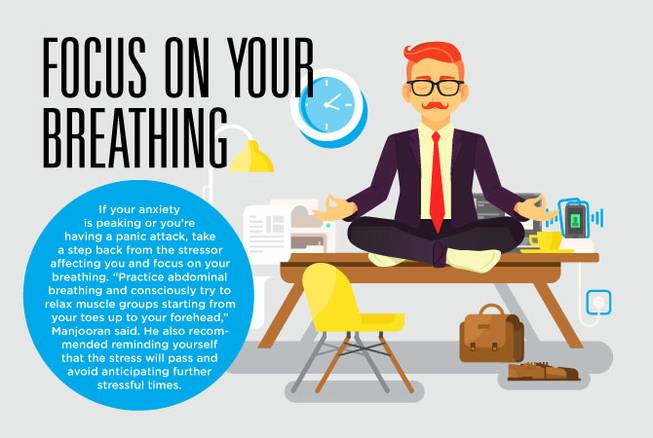
Monday, July 18, 2016 | 2 a.m.
While anxiety can have a powerful role in human survival, it also can act as a massive roadblock.
The National Institute of Mental Health reports that anxiety disorders affect over 18 percent of adults in the United States, making it the most common mental illness in the country. Three percent of Americans suffer from panic disorder, a type of anxiety defined by the occurrence of panic attacks. There are likely even more silently coping or undiagnosed, and nearly everyone has experienced the sensation of feeling anxious.
“An anxiety disorder can be debilitating, but it’s also a medical condition that can be treated,” said Jacob Manjooran, M.D., a board-certified psychiatrist at Southern Hills Hospital and Medical Center. Here are tips for how to identify and how to deal with anxiety.
What is anxiety?
Occasional anxiety and worry are normal feelings that everyone will experience at one point or another. “Anxiety can be good — it’s useful for survival and is the result of evolution. The ‘fight or flight’ response is a reaction to anxiety that protects the species. However, when anxiety occurs frequently and/or during inappropriate situations, it can become disabling,” Manjooran said.
An anxiety disorder occurs when someone experiences ongoing, excessive anxiety.
There are multiple types of anxiety disorders with varying symptoms and severity. These are the symptoms of generalized anxiety disorder:
• Difficulty controlling and/or rationalizing the worry
• Feeling on edge, irritable and/or fatigued
• Difficulty concentrating
• Muscle tension
• Sleep problems
What causes anxiety?
Many different factors can contribute to an anxiety disorder, such as personal experiences, personality, genetics and the exposure to stressful or traumatic events.
“When we experience anxiety, we automatically employ what’s called ‘defense and coping’ mechanisms. People who did not adequately learn adaptive coping mechanisms during childhood and early adulthood will be more susceptible to anxiety,” Manjooran said. There are other physical and mental conditions that can cause anxiety or panic attacks, as well.
Although some people may be more prone to anxiety disorders, anyone can succumb to personal and/or environmental stressors that cause anxiety. “If the stress is intense enough, theoretically it can overcome anyone’s coping/defense skills,” Manjooran said.
An anxiety disorder is contingent on a period of persistent anxiety, but it’s not a lifelong diagnosis for many people. It can be caused by stressful circumstances and lessen as those circumstances change and/or the patient develops appropriate coping mechanisms.
When anxiety leads to panic attacks
The term “anxiety attack” often is used interchangeably with “panic attack,” but the two are different. “An ‘anxiety attack’ is a nonmedical term that tends to describe a range of physical and emotional experiences, usually in response to stressful triggers such as job loss or interpersonal conflict. A ‘panic attack’ is a clinical term that describes a period of fear or discomfort and is defined by the presence of four or more symptoms,” Manjooran said.
The symptoms for a panic attack include:
• Excessive trembling
• Accelerated heart rate or heart palpitations
• Shaking or trembling
• Difficulty breathing or the sensation of shortness of breath
• Chest pain
• Feeling of choking
• Nausea or abdominal distress
• Feeling dizzy, light-headed or faint
• Numbness or tingling sensations
• Chills or hot flashes
• Feeling of unreality or detached from oneself
• Fear of losing control
• Fear of dying
Panic attacks usually last five to 10 minutes, but the symptoms are intense and come on suddenly, often occurring without an apparent or obvious trigger. The defining feature of panic disorder is the occurrence of panic attacks, but these attacks can be symptomatic of other anxiety disorders, as well.
Treatment
Once diagnosed, treatment often consists of three components:
• Psychotherapy to explore underlying causes of the anxiety and to shore up better defense mechanisms.
• Practicing behavioral techniques to help curb the symptoms such as meditation, abdominal breathing, muscle relaxation and exercise.
• Medications such as anti-depressants; and for short- term/as-needed use, benzodiazepines.
If your anxiety begins to affect your daily life and/or your social, educational or occupational functioning, see your doctor immediately. There are many methods for treating anxiety, so the sooner you get help when you need it, the better.
Coping skills
Leading a balanced lifestyle and avoiding stressors when possible can help when managing anxiety. Getting enough sleep, staying hydrated, eating healthy and following a regular exercise/meditation regimen can be helpful.
Manjooran also recommends avoiding activating substances such as caffeine, nicotine and alcohol.
Coping skills are different for everyone, so it’s important to find a calming activity that works for you when you start feeling anxious or like you may have a panic attack. “Some people listen to music, some take a walk or read a book — some even do a vigorous workout. Find out what helps relax you,” Manjooran said.
If your anxiety is peaking or you’re having a panic attack, take a step back from the stressor affecting you and focus on your breathing. “Practice abdominal breathing and consciously try to relax muscle groups starting from your toes up to your forehead,” Manjooran said. He also recommended reminding yourself that the stress will pass and avoid anticipating further stressful times.

Join the Discussion:
Check this out for a full explanation of our conversion to the LiveFyre commenting system and instructions on how to sign up for an account.
Full comments policy